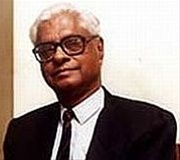Farewell to Bomb Mama
As a team of incurable pacifists, we were naturally wary of the distinguished-looking editorial consultant who was introduced to us as the father of the Indian bomb.
VIDYA SUBRAHMANIAM on the journalistic side of defence analyst K Subrahmanyam.
For the movers and shakers of the international security establishment, he was the last word on Indian strategic thinking. To his critics, he was the nuclear hawk, who pushed India to get the bomb, thereby irreversibly overturning the Nehruvian consensus on disarmament. But to us, a handful of editorial writers who worked with him in the Times of India (between 1995 and 2003), K Subrahmanyam was our dear "Bomb Mama".

As a team of incurable pacifists, we were naturally wary of the distinguished-looking editorial consultant who was introduced to us as the father of the Indian bomb. And yet over time, as we interacted with him, we felt blessed to have him in our midst. His institutional memory was phenomenal; he could recall dates, time and events, stretching back to half-a-century and more. But most of all, we were impressed and touched by Bomb Mama’s humility, his amazing ability to treat each one of us as equal and his complete disinterest in personal advancement of any kind.
With Subrahmanyam and the rest of the team placed on opposite sides, the morning editorial meeting was invariably a riot. But while he steadfastly held his ground, he was never dismissive of the counterview, no matter that it came from the junior-most edit writer. Instead, the counterview would be rebutted in the next day’s column. Only he knew and we knew that the "critics" he took swipes at in the column were actually us!
He was on first-name terms with a host of world leaders – a fact we got to know one day when he casually referred to a conversation with a certain Henry. Puzzled we asked, "Henry who, Sir?" Kissinger, he said, as if we were all buddies with Richard Nixon’s Secretary of State. It didn’t occur to him that not everyone had access to the world’s who’s who.
Subrahmanyam never missed his deadlines for edits and signed pieces, though he was severely diabetic and had a crippling heart condition. A day after a major heart surgery he sent in an editorial written from the hospital bed. His hospital trips became more frequent after he was diagnosed with cancer but he would not let on that the piece he had sent across was written after a debilitating chemotherapy session. Bomb Mama wrote in long-hand. Once the text was so indecipherable that I called him. He was at the hospital and his glasses had gone missing. I gently admonished him for writing in this state. His reply was that he saw it as a challenge and a test of his endurance.
Bomb Mama was a beguiling combination of child-like curiosity and sagely detachment. He watched indulgently as the younger brood agonised over designations and the size of their cabins. One summer day I found him leaning against a desk in the open area, furiously writing out his edit for the day. His own cabin was occupied by two young interns who had no idea they had displaced India’s venerated security guru. To him the fact was of no consequence.
When Subrahmanyam’s blood sugar level fell, he loudly munched his peppermints regardless of the occasion: it could be a tediously-long meeting called by the paper's management or a VVIP "gracing" us with his visit. He lived simply, South-Indian style, and though honours and recognitions came to him, he turned down most of them. He declined the offer of a Padma Vibhushan, and when the journalist interviewing him - on his reasons for refusing a coveted State honour - struggled to frame the questions, he sportingly wrote out the questions and the answers.
Prime Ministers went to his house to meet him. He was the Chanakya whose counsel was sought. But for us, he was our Bomb Mama, fiercely attached to the 30-odd jars of pickles that sat atop his fridge and animatedly discussing the best way to make thayir sadam (curd rice).